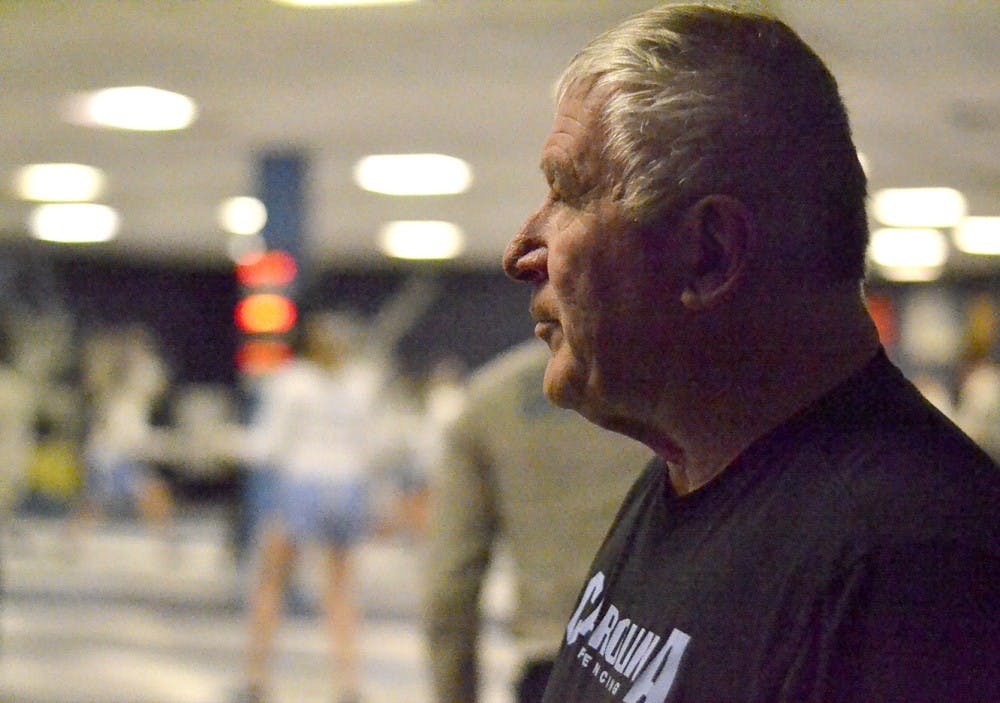Becoming a coach
At first, Miller wanted to be an architect. Fencing was just a hobby he started for a friend’s sake. But when Florida’s great freeze in 1962 destroyed his father’s crops overnight, he had to give up architecture school.
“There was no money,” he said. “I mean, we lost everything.”
That did not deter him. At community college, he designed swimming pools. Although he enjoyed it, he knew it was not the career for him.
“I realized that sitting behind a drawing board eight to 12 hours a day (was) not who I was,” he said. “... The only other thing that I really enjoyed was some kind of physical activity, athletics.”
So he transferred to Florida State and finished graduate school at Eastern Kentucky, where he started a fencing club that competed in the state championship.
At a convention in Kentucky, Miller ran into an old professor of his. In the professor’s class, he had written a term paper on kinesiology and applied anatomy of fencing.
The professor enjoyed the paper and knew someone else who would — Richard Jamerson, UNC’s chairperson of the Department of Physical Education at the time.
UNC had a club fencing team that Jamerson believed could become a varsity program. But he needed a coach.
So Miller’s professor introduced him to Jamerson, which led to a job offer as a physical education teacher and fencing coach.
“It’s amazing when you write a term paper how much it might affect your life,” Miller said.
‘A little home’
To get the day's news and headlines in your inbox each morning, sign up for our email newsletters.
Under Miller’s leadership, the fencing program has taken off. The team that was once all walk-ons is now 85 percent recruits, and both the men and women are ranked in the top 15 in the country.
But fencing is about more than just a talented team.
“The main issue is that everyone cares about everyone else — that everyone supports everyone else,” Miller said. “That your teammates are your family.”
First-year right-hand foil Sydney Persing said Miller maintains closeness by alleviating intra-team competition.
“I think that Coach has made it that kids work hard and they’re competitive, but it’s healthy,” she said. “And at the end of the day your opponent is Ohio State or Duke, not UNC.”
Miller takes on the role as caretaker of his athletes beyond fencing. When Persing got sick in her first week at UNC, she called Miller, who took her to the doctor for treatment.
“I kind of call him like my ‘on-campus parent,’” she said. “He’s there for anything I need.”
Persing said she transitioned seamlessly into college life because of fencing. She has made some of her closest friends on the team and is able to turn to her coach for guidance beyond fencing.
“I feel like I have a little home in a really big place,” Persing said.
Silly and serious
Growing up, Miller and his daughter Caroline Walton had the same routine every morning.
“He would always say, ‘Are you alive, awake, alert, joyous and enthusiastic about life?’” Walton said.
“He would say that — that exact same order of words — every single day.”
Walton said Miller made everyday moments fun through the way he made silliness and seriousness coexist.
He coaches his team the same way.
Even as the athletes ran sprints at the end of practice on Jan. 19, they stayed playful.
Fencers encouraged each other and occasionally cracked jokes — which were met with spurts of laughter between the panting.
Miller paced back and forth, directing the sprints but also smiling and offering words of encouragement.
“I don’t motivate by speeches or by yelling at them or, you know, that type of thing,” Miller said before pausing.
“I think leadership and motivation is very much by example. If you are a calm, self-satisfied person, if you believe in what you do, if you treat people equally, if you show value for work, those are the things that motivate people, because they feel that what they did is important.”
Still going
After coaching for 49 years, Miller has seen changes not only in fencing, but in the athletes he works with.
He said this generation is much more focused on immediate results. Now, he works to help his athletes see the bigger picture.
Keeping up with the changes is hard, but Miller doesn’t slow down.
“A lot of my friends that are my age or younger have given up the coaching profession because they can’t deal with it,” he said. “But to me, it’s — if everything stayed the same, it would be boring.”
Miller loves coaching because he can help people learn something new and achieve their goals. He won’t stop doing what he loves just yet.
“He lives every day like he’s never worked a day in his life,” Walton said. “Like everything he does is just, you know, the next fun adventure that he’s going to do...
“It’s just an awesome way to approach your life.”
@BlakeR_95
sports@dailytarheel.com




